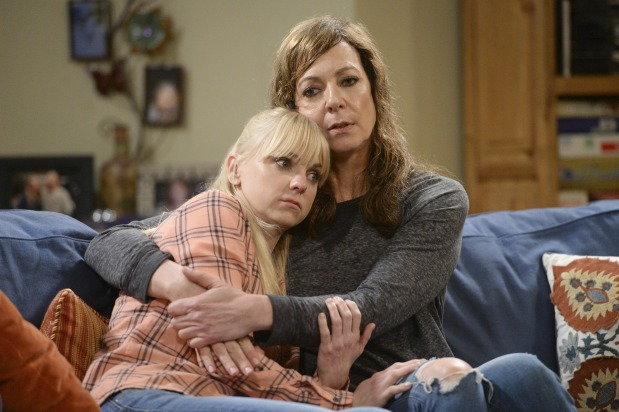As every individual struggling with addiction knows, life in recovery is no sitcom episode. There’s no afternoon special breaking down the “good” and the “bad” of an addict’s journey; no cookie cutter solution on dealing with the problem of cravings. Nor is there an annoying neighbor to burst through the front door just in time to stop a relapse. No, if anything, recovery is much more like an uncut documentary—shot entirely on a shaky camera.
So it’s peculiar that Mom, a 30-minute show birthed out of the Chuck Lorre creation camp, is able to do what so many other television genres have a hard time doing: capturing the real ups and downs of recovery addicts navigating everyday life (and how both ordinary and extraordinary it is—with or without a laugh track). The show has received great critical review and Allison Janney has already taken home two Emmys for her role as Bonnie Plunkett, the lovable and dysfunctional mother of Christy (played by Anna Faris). Needless to say, the creators of Mom show no signs of slowing down what has thus been working for them: tackling serious topics all while shining a light on the humor and happiness entangled in it all.
I had the chance to speak with co-creator Gemma Baker on the show’s successful third season and how humor can play such a powerful role in recovery.
It seems like right now in the TV landscape, there are a lot of shows about addiction and, specifically, recovery. Do you feel like the recovery journey in it of itself is a good template for storytelling?
First of all, I think it’s fantastic that there are a lot of shows that are dealing with recovery right now and showing it in a positive light. Before, we would see recovery come up in the last five minutes of a movie—a character would just go off to rehab in the end and that’s the happy ending. But I think that for so many people, getting into recovery is the beginning of the story. And so it’s great to be able to start the story from that point and to explore characters who are trying to do better, but fall short anyway.
Yeah.
It’s the trying that’s important.
Absolutely. Well, I know that Mom has been talked about quite a bit in our forums, and a lot of the feedback seems to be around how real and authentic it portrays the everyday goings-on of those in recovery. Is there a standard that writers and producers set out to meet in order to create a certain message?
I think before Mom we have seen AA meetings in TV and movies as this glum and depressing place where everyone was sad and hopeless. And for those of us who have been touched by recovery in some way knew that that wasn’t what it was like. That recovery is actually filled with laughter and tons of hope. And I think it’s important for us to show meetings as a place where there is happiness and laughter and lightness.
Speaking of meetings, when I was watching the show, I was surprised at how frequently the language of Alcoholics Anonymous is used. In one episode, the characters even end by reciting the Serenity Prayer together. Was there any concern at all while creating the show of alienating those who aren’t part of the AA world?
No, we didn’t set out to do a show about recovery; we set out to do a show about a character named Christy. Originally, the idea was that she was going to be an active addict, alcoholic and a complete mess. But we realized that people might not be able to find humor in a character who was not a good mom to her children, especially young children. So, instead, we decided to start the story with Christy in early recovery, so that the audience would know that the kids were safe, that she was trying to do better and that they could root for her. And I think that the idea of wanting to be a better version of yourself—the notion of wanting to move past mistakes that you’ve made—is very relatable. Whether or not you have addiction—or know someone in addiction—I think that’s a universal scene that people understand.
I would hope so. I also feel like having to represent recovery in a realistic way is quite a tall order. How do you balance being realistic and positive, without coming off preachy or even cheesy?
Well I think it’s important to note that we’re usually finding humor in recovery—not addiction. So we’re finding humor in people trying to do better and falling short. And so I think that because people make a lot of mistakes, we don’t tie every episode up with a bow. People make mistakes and there are consequences. And I think that’s part of the reason why Mom works—we have emotional moments and we tell difficult stories. It’s not just always wall-to-wall jokes because that would be difficult for people whose lives have been torn apart by the disease of alcoholism and addiction.
And the other thing that is great is that we have this incredible cast that is so incredibly talented and so funny. We were nervous in the beginning about having such a flawed character as Christy. Would people be able to respond to her? And I think Anna Faris is so loveable that people can forgive her so much. And Allison Janney’s ability to make you laugh, and then make you cry, and then make you laugh, in a minute, is remarkable. So we’re really blessed to have these characters who I think people are really identifying with. People really care about the characters—the whole group that goes to the meeting, including Mimi Kennedy as Marjorie and Jaime Pressly as Jill, and Beth Hall as Wendy—and they want to see what’s going to happen to them and how they’re going to handle it.
I also want to touch upon the idea of women in addiction. Mom predominantly centers around women characters. Is it different writing about addiction through women’s perspective, than if you were writing about a man’s experience?
What’s been interesting to write about on Mom is writing about a mom—lots of moms—who have addiction. So often the TV mom is the one that says and does the right thing, and it’s interesting to us to write about these moms who’ve made mistakes and who are trying to overcome that and deal with their own demons—not only for themselves but for the betterment of their families.
Also, with women in addiction, there tends to be, for some reason, more stigma. Research has also shown that women struggling with addiction tend to reach out for help less than men. So, women in addiction may be an even less exposed story.
Yeah, absolutely.
Well, one other thing that I discovered in our forums was someone actually commenting about the show and saying that “watching an episode last night stopped my normal Friday night craving dead in its tracks.” Have you received other similar reactions from audiences?
Yeah, I mean, definitely the biggest compliment we can hear on this show is that Mom has helped people to either feel not alone, to have hope or to get sober. We just set out to—as comedy writers—to tell stories and make people laugh. And if along the way, people are, in any way, inspired by our show to make a change, that’s amazing. That’s huge. So I think that humor has that kind of power to allow you to talk about things that people don’t usually talk about and to offer perspective. If you’re able to laugh at something that scares you, then it’s suddenly not as scary as it was before.
That’s very true. And for my last question, I’m curious to know—where do you see the characters going in Season 4?
We have no idea. We’re just taking a little break to breathe and regroup ourselves, and then we’ll go back to it. But I think in general, I think I would like to see what happens as the characters continue sobriety and they have more of their dreams come true and sort of the problems that come along with that too. I think there’s a lot of humor in that. But we’ll see where it goes.
You can tune into Mom's season 3 finale this Thursday, May 19 on CBS at 9/8c p.m.







